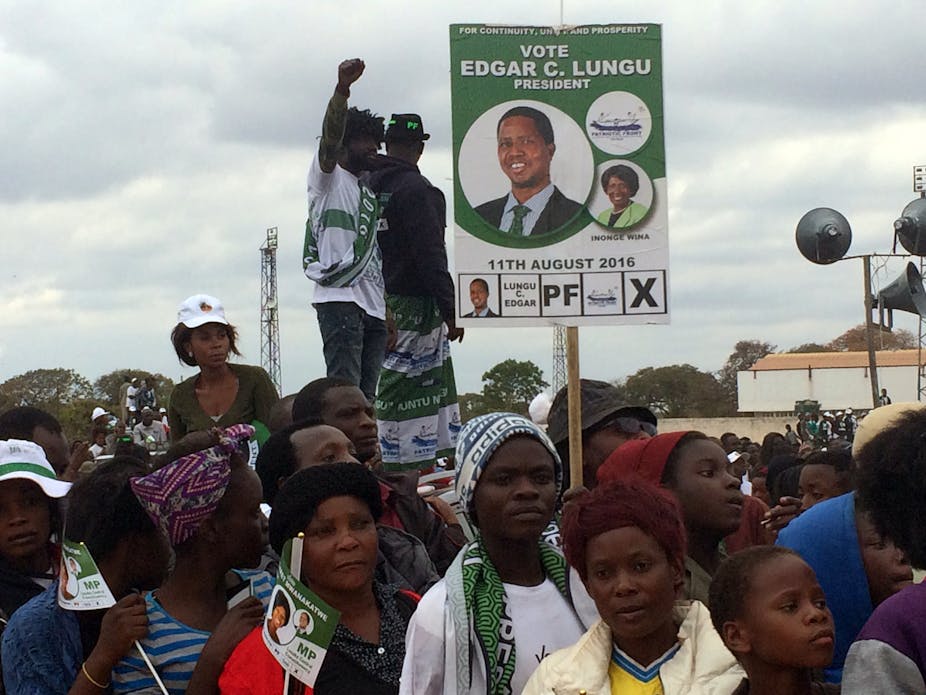President Edgar Lungu of the Patriotic Front (PF) has been declared winner of the most closely fought election Zambia has witnessed since adopting a multiparty system in 1990.
Lungu polled 50.35% in the August 11 election. He had a 100,530 vote lead over his closest rival, Hakainde Hichilema of the United Party for National Development (UPND). Hichilema polled 47.63%.
Lungu’s victory bequeaths on him and his party the immense task of post-election socioeconomic management and governance.
It is now common for political contestants to spar on economic issues. In this election attention was focused on some of the major infrastructure projects rolled out by Lungu’s predecessor, the late Michael Sata. While Lungu’s supporters could point to his accomplishments, few gave serious thought to the debt Zambia has accumulated to finance those projects.
Zambia’s mountain of debt must be serviced. For the president the big question is: how? Lungu should neither consider victory to mean business as usual in the management of the economy nor an opportunity to waste or plunder. One need not look too closely to see the corruption and waste of public resources in the past five years of the PF’s rule.
A better way for Lungu to celebrate victory would be to seriously reflect on both the accomplishments and the misuse of the PF’s past term in office. He should also develop a concrete agenda to steer Zambia forward.
Uniting a country fractured along regional lines
Rallying supporters and opponents in the post-election period is a necessary task for the victor. However, the level of polarisation leading to Zambia’s 2016 polls was unprecedented. In addition to violence, divisive language in the media and by politicians, the voting patterns clearly reveal a country split between the south-west and north-east. Support for Lungu was largely concentrated in the north-east and for Hichilema in the south-west.
One of Zambia’s founding president Kenneth Kaunda’s nation-building strategies after independence was promoting social cohesion through internal migration. As a consequence, many of the country’s citizens from its 72 tribes and languages intermarried. Lungu can build on the foundation established by Kaunda’s “One Zambia, One Nation”.
But the onus of uniting Zambia is not solely the president’s. Apart from appealing to the population, he should extend the olive branch to his arch-rival Hichilema as well as to smaller parties’ presidents. In turn, they should also publicly appeal to constituents and the nation and prove that they are genuine in their aspiration to lead Zambia.
Fixing the electoral system
It took the Electoral Commission of Zambia four days after the polls had closed to announce the final results. Voters elected four categories of office bearers – from president to local government officials. They also voted in a referendum on a new Bill of Rights. The election was the first of its kind. Numerous malpractices and irregularities were reported.
The main opposition party alleged outright rigging claiming that the electoral commission had connived with PF to steal the vote. The UPND – and indeed any other party with reservations – has seven days to petition the results with Zambia’s Constitutional Court.
But whether they petition or not, the commission’s credibility is sullied. The African Union Election Observation Mission to Zambia, headed by former Nigerian President Goodluck Jonathan, declared the polls peaceful and satisfactory. But other election observer missions from organisations such as the Electoral Institute for Sustainable Democracy in Africa reported that the elections were conducted “on an unlevelled playing field”.
The August 2016 elections were held under a legal framework and electoral rules introduced just a few months earlier. This posed management challenges associated with new and untested provisions.
Additionally, the electoral institute identified several other issues with the framework. These included high election registration fees and the requirement for all candidates to be holders of Grade 12 certificates. These have the potential to lock out young and female candidates.
The commission’s apparent lack of efficiency and transparency was exhibited in several ways:
Delays in releasing election results led some opposition parties to question the commission’s neutrality and its leadership
Even before the election, media reports suggested that there were foreigners on the voters’ roll and blamed this on the country’s electoral commission
The commission also delayed releasing the voters’ roll to stakeholders, raising doubts about the roll’s validity.
But clearly, Lungu will have to work on more than just the mechanics of the electoral system. He will also have to address the issue of the commission’s leadership. If there is any lesson he can learn from Kenya, it is that vacillating on changing the face of the commission only agitates discontented supporters of the losing party further. Reforming the electoral system should involve collaboration between all stakeholders.
Ordinary Zambians show the way
On the whole, Zambians have once again demonstrated commitment to preserving peace and nurturing the country’s nascent democracy. The turn was probably made at the death of an incumbent president Levy Mwanawasa in 2008 and cemented after the death of another, Sata, in 2014. The peaceful conduct of Zambians through these trying times defies logic in an African country. The 2016 elections reportedly had a high voter turnout too.
The conduct of Zambia’s general population thus suggests one thing. The national leadership should rise to the occasion and move the country in the right direction. To do this Lungu should build a team of selfless political, technocratic and civic leaders to steer Zambia for the next five years. Certainly, he will also need the support of the opposition parties, big and small.

